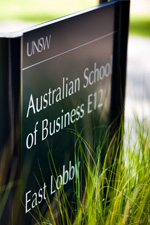International Business/Global - 8370
Program Summary
Faculty: UNSW Business School
Contact: UNSW Business School Student Centre
Campus: Sydney
Career: Postgraduate
Typical UOC Per Semester: 24
Min UOC Per Semester: 6
Max UOC Per Semester: 24
Min UOC For Award: 96
Award(s):
Master of International Business
Master of International Business (Specialisation)
View program information for previous years
Program Description
If you are a prospective student researching your study options, please visit UNSW Business School website for more information.
The Master of International Business Global offers students a comprehensive postgraduate study program in international business incorporating depth of study in the disciplinary knowledge of international business in the context of other disciplines, and broad scope of business knowledge and skills. The Master of International Business Global dual degree program requires study overseas at a partner institution chosen from leading international universities.
The Master of International Business Global program enables students to develop knowledge and skills from studying in a varied international cultural context, gaining knowledge and experience of other national and business environments. After successfully completing the program, candidates will obtain two degrees - graduating from UNSW with the Master of International Business Global and a further degree awarded by the partner institution. The latter is selected on entry to the program of study. The program provides a unique experience of internationally based learning, as well as knowledge and skills for business at the global level.
Program Objectives and Graduate Attributes
The Master of International Business Global degree is designed for those seeking a professional career in business in a global context. It seeks to enhance the knowledge, skills and experience of candidates based on their initial postgraduate work experience in providing a unique type of qualification to develop career opportunities.
Program Structure
- 48 UOC completed at UNSW-with 5 core courses and 3 elective options
- 48 UOC completed at the partner university.
- ACCT5907 Int'l Fin Statement Analysis (6 UOC)
- ECON5130 Financial Systems &The Economy (6 UOC)
- FINS5516 Int'l Corporate Finance (6 UOC)
- FINS5550 Intl. Banking Management (6 UOC)
- INFS5885 e-Business (6 UOC)
- MARK5815 Intl. Marketing in Asia (6 UOC)
- MGMT5603 Global Business Strategy & Mgt (6 UOC)
- MGMT5604 Asia-Pacific Business & Mngt (6 UOC)
- MGMT5606 Chinese Business and Mngt (6 UOC)
- MGMT5949 Internat. Human Resource Mngt (6 UOC)
- TABL5562 Business Law in a Global Econ. (6 UOC)
- TABL5583 International Business Tax (6 UOC)
- GBAT9101 Project Management (6 UOC) OR
- ZINT8326 Project Mngmt (6 UOC)
- Language
- With the approval of the MIB Program Director other courses may be taken
- Shanghai Jiao Tong University at the Antai College of Economics and Management (award is an MBA from this University)
- Korea Advanced Institute of Science and Technology at the College of Business (award is an MBA from this University)
Academic Rules
Students need to satisfy any additional entrance requirements as stipulated by a partner university.
Students need to apply separately for enrollment into partner university program at commencement at UNSW once they have successfully enrolled into the MIB program.
The Shanghai Jiao Tong University ANTAI program requires a satisfactory GMAT score for entry and 1.5 year to complete both course work and thesis.
Chinese Citizens and Permanent Residents of Hong Kong, Macau and Taiwan are not permitted to undertake the ANTAI program.
Fees
Entry Requirements
Please refer to the UNSW Business School website for further details.
Further Information
Students are advised to follow requirements according to the year they commenced. Please refer to previous editions of the Online Handbook for your program requirements.
Contact the UNSW Business School Student Centre for advice.
tel: + 61 2 9385 3189
location: Level 1, room 1028, Quadrangle Building
Forms, policies and procedures
Frequently asked questions
Area(s) of Specialisation









